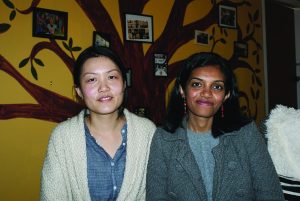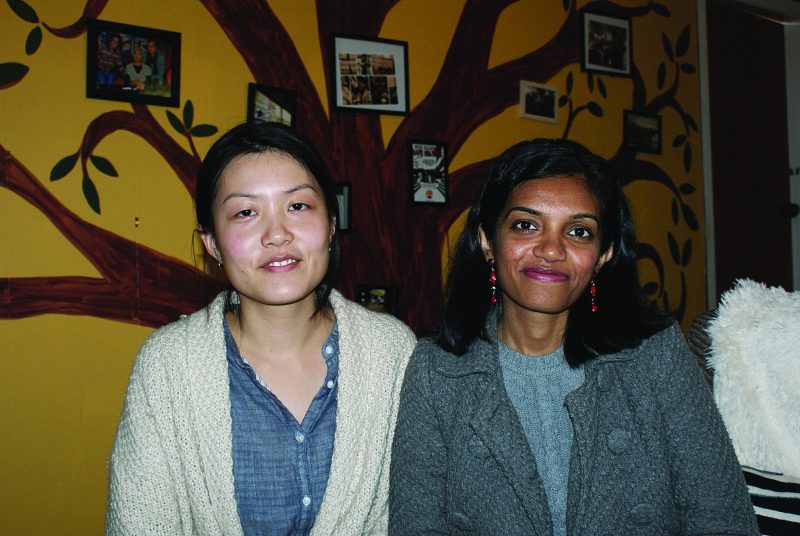by ROWENA OREJANA
A group helping ethnic migrant women in situations of domestic abuse is calling on religious leaders to help give women the choice of getting out of violent relationships.

Shakti funding officer
Sara Chin (left) and coordinator Wendy Vyas in their office at Shakti Community Council in west Auckland.
Shakti Community Council Incorporated, a group that provides help to women who want to get out of violent domestic situations, celebrated its 20th anniversary on August 20. Auckland’s Catholic Caring Foundation recently supported them with a grant.
Shakti’s south Auckland coordinator Wendy Vyas said they want women within the Catholic community to know that there is help available if they find themselves in such a situation.
“There doesn’t seem to be much information around as to where to get help,” she said, stressing that they are always available through their helpline 0-800-SHAKTI (0800 742 8584).
Funding Officer Sara Chin further explained: “I think there’s a common perception, perhaps wrongly conceived, that somehow religion prevents you from happiness or safety. And that’s not true.
“A lot of us have religious faith,… And so I think it’s important for religious leaders to come on board and give people who rely on them the choice.”
Ms Vyas said she has a strong Christian faith as well, and that saw her through her own experiences of abuse.
“For me, it started out first, ‘Why me’? Because I was a very devout Christian myself, so that’s the biggest thing. Why me? God is supposed to protect his children, not do this. That is the biggest thing I had to overcome and continue with my faith, which helped a lot,” she said.
Recounting her experiences, she said she was admitted to hospital in 2012 with severe injuries after she was assaulted by her husband.
When she wrote down the chronology of abuse she had been through, she
realised it had been happening for about six months already.
“It started with a slap, then a couple [of slaps], then pushing. And it escalated,” she recalled. “The first time I was slapped, I was shocked. I thought this couldn’t be happening to me.”
Because outside their relationship she was leading a “normal” life, her ex-husband would always undermine her, saying no one would believe she was being abused.
However, with the help of Shakti she was able to find the strength and empowerment to leave the relationship.
“That’s why I would never judge a person. If a woman comes to me and tells me, ‘I am stupid for letting this happen’, I would tell her, ‘It’s not your fault. Don’t blame yourself,’” she said.
Ms Chin said they help Asian, Middle-Eastern and African women, because those are the communities that they themselves come from.
They understand intricacies of the cultures that are often a big stumbling block for women wanting to leave their abuser.
“Because the women we help are mostly migrants, they don’t have personal support. Maybe even your family is not on your side, because you decided to make this move. Or how exactly will you survive in New Zealand?
“A lot of them could have immigration complications, when they could be sponsored by their abuser or, in some cases, when they separate, she would be taken out of the country and may be separated from her children,” she said.
The two women added that many people have a preconceived notion of what a survivor looks like: someone poor and uneducated.
“But we have women coming in who are literally rocket scientists in their own countries,” Ms Chin noted.
Ms Vyas said what they do is to help the women realise their own strengths.
“They are empowered women themselves from the time they left their own country. But it’s just tapping more into their empowerment and bringing them to that level where they realise their own potential,” she said.
Ms Vyas said they will never demand that a woman in a domestic abuse situation leave their abuser.
“We work with them. We tell them, ‘Look you decide’,” she said, explaining that the act of deciding is empowering.
In the meantime, they give the women the tools they need to enable them to leave their relationships when they feel threatened.

Reader Interactions